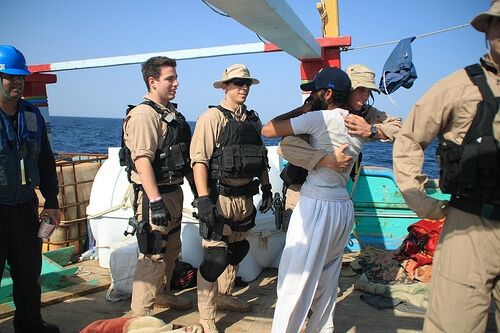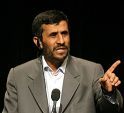 Everything you need to know about the weekend media coverage of Israel and the Mideast.
Everything you need to know about the weekend media coverage of Israel and the Mideast.
Hamas lauds cyber attack as “virtual resistance,” Iranian media suggests that US rescue of sailors was a planned propaganda stunt, and India appears to be replacing Turkey as Israel’s partner in security collaboration.
Stay up to date: visit Backspin every day.
Israel and the Palestinians
• Responding to Aaron David Miller, the LA Times gave op-ed space to Phyllis Bennis. She blames Obama’s “Israel problem” on “Israel’s fundamental policy towards the Palestinians.”
• Dennis Ross says Israel can head off Hamas influence in the West Bank by opening up more economic opportunity. He writes in a Washington Post op-ed:
So, one meaningful step would be either to stop all such incursions in Area A or, if there are continuing security concerns, to phase them out based on the security situation. Gabi Ashkenazi, former chief of staff of the IDF, has consistently said that “as the Palestinians do more on security, we will do less.” A gradual ending of incursions in Area A would certainly be consistent with that axiom.
In Area B, about 22 percent of the West Bank, Palestinian police maintain law and order but are not permitted to deal with terrorist threats. Israel could allow their presence to grow. From my discussions with Israeli Defense Minister Ehud Barak, I know that he is open to increasing the number of Palestinian police stations and broadening the areas where Palestinian security personnel operate. Now would be a good time to take these steps, as any such expansion would certainly be noticed, and welcomed, by the Palestinian public.
Finally, in Area C, which is about 60 percent of the West Bank, Palestinians’ security and police forces have no access, their economic activity is extremely limited, and Israel retains civil and security responsibilities. There is no practical reason that the Palestinians cannot be permitted dramatically more economic access and activity in this area.
 • Worth reading: Dore Gold discussed the Palestinian statehood bid with Slate:
• Worth reading: Dore Gold discussed the Palestinian statehood bid with Slate:
The Palestinian agenda is very different from the agenda in the Arab countries. I think the actual drive for statehood, away from the context of negotiations, began in 2008, when the Palestinians saw Kosovo declare independence and seek U.N. membership. What’s happening now has its roots in that development, I think, and not in the Arab Spring.
Slate also interviewed Mustafa Barghouti and published an op-ed by Aaron David Miller.
• Hamas lauds cyber attack as “virtual resistance.” While Israelis say posting credit card info online is “terror”, the People’s Republic of UC-Berkeley presumably regards the incident as “protected free speech.”
Meanwhile, an Israeli student says 0xOmar is Omar Habib, a UAE-born student currently living in Mexico. More on 0xOmar’s followup at E Hacking News.
Arab Spring Winter
• Fatah can only grumble as Hamas takes advantage of the Arab Spring.
- First, Arab League chief Nabil Elaraby asked Khaled Meshaal to ask Assad to halt the violence. The PLO grouses that Palestinians shouldn’t meddle in the affairs of other countries.
- Second, PLO representatives in Tunisia say they were ignored by Ismail Haniyeh during his talks with the new government.
• According to CNN, Egypt still hasn’t returned money or property it seized in raids on pro-democracy NGOs.
The actions by the Egyptian police contradict assurances the State Department says were given to the U.S. ambassador by Egyptian authorities.
• Dissing Tehran: Syria’s Muslim Brotherhood Rejects Iranian Initiative
Iranian Atomic Urgency
• A picture tells 1,000 words.

The Iranian regime thanked the US, but the Fars News Agency sees through the Great Satan’s propaganda ruse:
Iran’s navy has on so many occasions rescued foreign ships from pirates, but they have never been praised and hailed by foreign media, because the Iranian navy officials have never been looking for propaganda.
There is suspicion and doubt about this American action, which seems to have been pre-organized. A US helicopter filming the rescue operation from the first minute makes it look like a Hollywood drama with specific locations and actors.
The fact that the US navy has been prepared to film the entire incident since the very first moment shows the Americans were looking at using it for propaganda advantage.
• The Washington Post finds that Western sanctions are biting the Iranian economy.

• Elliott Abrams on Ahmadinejad’s Latin American Pariah Tour 2012.
There are perhaps twenty countries in Latin America and the Caribbean that are fully free, and it is no accident that Ahmadinejad appears to be visiting none of them. I am prepared to be disappointed, and to see one of the free countries (Argentina? Brazil?) invite him. That would be unfortunate, because it would signal a total lack of solidarity with the people of Iran in their struggle for free elections, human rights, and real democracy.
But on his present itinerary, Iran’s president is showing just what he and his country have become: the dictators are sticking together, and his Latin American visit is a pariah tour.
• The UK threatens to respond militarily if Iran closes off the Straits of Hormuz. Daily Telegraph coverage.
Rest O’ the Roundup
• Writing in the Hindu Business Line, Gopalapuram Parthasarathy describes deepening Israel-India security collaboration. Is New Delhi filling Turkey’s void?
As India seeks industrial development in areas of high technology and the involvement of its private sector in areas like defence and aerospace, Israel has emerged as an important partner.

On a possibly related note, Pervez Musharraf — the former president of India’s rival, Pakistan — raised a trial balloon in a Haaretz interview. If the exiled Musharraf’s planning a political comeback, he’s not going to endear himself to a lot of Pakistanis, and certainly not the BDS movement.
“Pakistan also needs to keep readjusting its diplomatic stand toward Israel based on the mere fact that it exists and is not going away.”
• Israel’s creating a “virtual fence” in the Red Sea to protect itself from Egyptian terror. The Jerusalem Post got an exclusive tour.
• Shira Herzog (Globe & Mail) takes a measured look at religious-secular tensions reaching the IDF:
Neither gender equality nor religious accommodation are new to the military (or society at large, for that matter), but the juxtaposition of more religious soldiers and more women in combat units and training positions has brought the issue to a head and sparked a new round of public debate.

• The French toast justice with their inability to do anything to help Israel bring Lee Zeitouni’s killers to justice:
Despite public consensus in both nations the pair should be handed over to Israeli police, that simply isn’t going to happen. As French Ambassador to Israel, Christophe Bigot, told a Knesset panel Jan. 3, though France shares the wishes of Zeitouni’s mourners in wanting to see the suspects tried in Israel, French law requires that the pair must return to Israel on their own for that to happen—a very improbable scenario, given their apparent efforts to flee.
• Washington Post ombudsman Patrick Pexton says some readers can’t keep up with all the web site’s bells and whistles. Then he adds that a lot of the staff feel the same way.
And I know from talking to folks in the newsroom that all the change may be exhausting the staff, too. Many of these innovations require considerable staff time, as well as more time from editors and reporters to monitor them. Staffers point out that The Post has 108 blogs; the New York Times has only 62 but with a much larger staff to fill them.
Staffers say that sometimes they feel as if the innovations are just tossed against a wall to see what sticks, without careful thought as to which of them will enhance and shore up The Post’s reputation and brand.
(Image of circuit board via Flickr/BotheredByBees; Ahmadinejad via Flickr/Daniella Zalcman)

